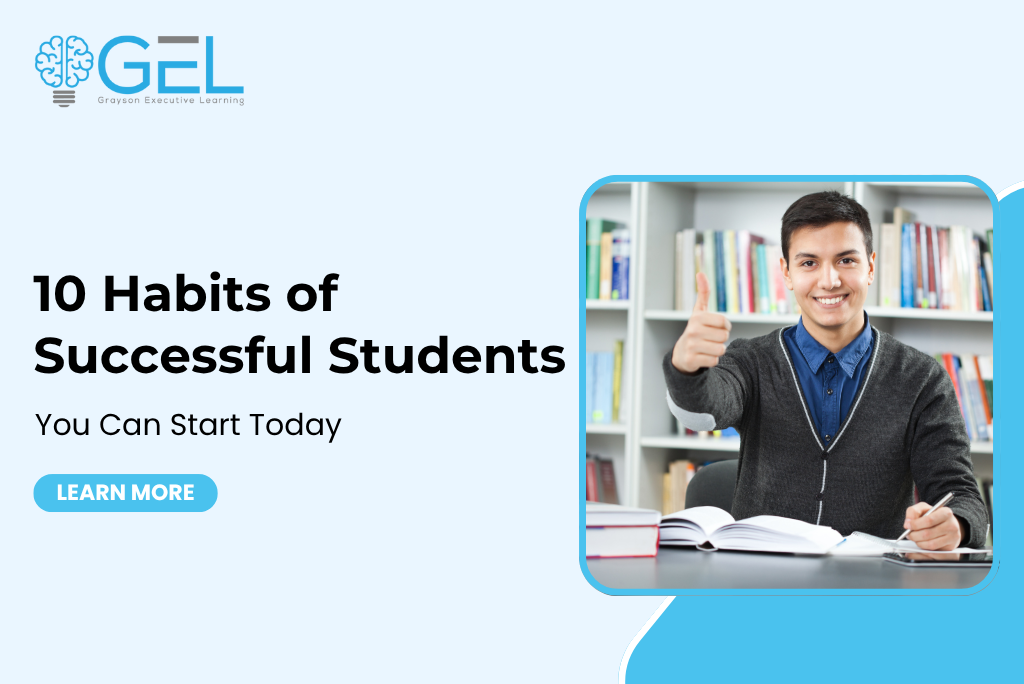Academic success often looks effortless from the outside: straight A’s, well-organized binders, and an uncanny ability to ace every exam. But here’s the truth: the habits of successful students aren’t based on talent or luck. They’re the result of consistent, intentional behaviors that anyone can learn and apply.
Whether you’re a middle schooler learning how to juggle homework and extracurriculars, a college student with ADHD navigating independent study, or a parent looking to support your child, this guide breaks down the daily actions that contribute to student achievement.
These aren’t just general “study hard” tips. You’ll get specific, practical, and science-backed habits that lead to better focus, less stress, and higher academic performance. Let’s dive in.
Why Students Struggle Without Good Habits
Before we get into the top habits, let’s take a moment to recognize what makes a student successful, and more importantly, what can get in the way.
Many students want to do well but struggle because of poor structure, disorganization, or unproductive study strategies. Without good habits, common challenges include:
- Irregular schedules that result in missed deadlines, late-night cramming, and burnout.
- Passive studying, such as rereading notes or highlighting without deeper engagement.
- Distractions from phones, social media, or noisy environments.
- Inconsistent review, which leads to forgotten material and test anxiety.
Fortunately, these issues aren’t fixed by working harder, they’re fixed by working smarter.
10 Key Habits of Successful Students
These strategies represent the core habits of a successful student. Each one is concrete, doable, and backed by real results.
1. Plan with a Weekly Schedule
One of the most essential work habits for students is mapping out your week in advance. High-performing students don’t just hope they’ll “find time” to study, they schedule it.
- Use a planner or digital calendar to block time for classes, studying, assignments, meals, and breaks.
- Visually seeing your week helps balance workload and reduces the likelihood of last-minute stress.
Example: Every Sunday night, take 15 minutes to map out your week, including due dates and prep time for upcoming quizzes.
2. Prioritize Tasks Using the Eisenhower Matrix
Ever feel busy all day but still behind on what matters most? Use this strategy to sort tasks into four categories:
- Urgent & Important (do now)
- Important but Not Urgent (schedule it)
- Urgent but Not Important (delegate or minimize)
- Neither Urgent nor Important (avoid or limit)
This simple tool helps you focus on high-value tasks and avoid busywork.
Example: Instead of starting with a color-coded title page, finish the science lab report that’s due tomorrow.
3. Set SMART Academic Goals
One classic habit of a good student is setting clear goals. Not vague hopes like “do better in math,” but SMART goals:
- Specific
- Measurable
- Achievable
- Relevant
- Time-bound
Example: “Complete five algebra problems from Chapter 3 by 6 PM Thursday.”
These goals give direction and purpose to your work.
4. Practice Active Note-Taking
Successful students don’t just copy down what’s on the board. They engage with the material through active note-taking strategies:
- Use the Cornell Method: Divide your page into cue, notes, and summary sections.
- Color-code information or underline key concepts.
- Rewrite notes in your own words after class.
This habit improves focus and retention during lectures or study sessions.
5. Use the Pomodoro Technique
One of the most popular work habits for students, the Pomodoro Technique helps maintain focus while avoiding burnout:
- Work for 25 minutes
- Take a 5-minute break
- Repeat 3–4 times, then take a longer break
Example: Use a Pomodoro timer to tackle reading assignments or review flashcards.
It’s perfect for students who get easily distracted or feel overwhelmed by long study blocks.
6. Review Material Daily
Spaced repetition, not cramming, is the key to long-term learning. Even 10–15 minutes of daily review can lead to significant gains in recall and confidence.
- Use flashcards, quick summaries, or apps like Anki or Quizlet.
- Make it a nightly routine before winding down.
Example: After dinner, spend 10 minutes reviewing that day’s science notes.
This habit builds mastery over time, reducing test-day panic.
7. Teach What You Learn
Another habit of a good student is to reinforce knowledge by teaching it. When you explain a concept aloud (to a friend, a pet, or even an imaginary student), you identify gaps in understanding and clarify the topic.
Try the Feynman Technique:
- Pick a topic you just learned.
- Explain it in simple language.
- Identify what you couldn’t explain well.
- Review and refine.
This habit of a successful student transforms passive learning into deep understanding.
8. Maintain a Dedicated Study Environment
Where you study affects how well you study. Create a space that signals “focus mode.”
- Quiet, well-lit, and clean
- Free from distractions like phones or loud siblings
- Stocked with the materials you need
Example: Keep your desk for studying only, and avoid doing homework in bed or while watching TV.
Students who stick to this habit of a good student find it easier to enter and stay in a productive state.
9. Practice Self-Care and Breaks
Academic performance depends on more than mental effort, it’s tied to your physical and emotional well-being.
Students’ good habits include:
- Getting 7–9 hours of sleep
- Eating brain-friendly snacks (nuts, fruit, protein)
- Taking movement breaks to refresh focus
- Staying hydrated
A healthy student is a focused student.
10. Reflect and Adjust Weekly
One of the most overlooked but vital habits is reflection. Set aside a few minutes each week to ask:
- What went well this week?
- What challenges came up?
- What will I do differently next week?
Use a journal, checklist, or simple voice memo to track insights. This reflection builds self-awareness and continuous growth, all hallmarks of a high-performing learner.
Pilot Blueprint: How to Start Today
It might feel overwhelming to take on ten new habits. Don’t. Start small and build momentum.
Phase 1: Pick One Habit
Choose the one that feels most doable right now. Example: Try the Pomodoro Technique for all homework this week.
Phase 2: Track Your Progress
Use a simple log, habit tracker, or app to see how often you complete the habit.
Phase 3: Reflect After 7 Days
How did the habit help? Did it improve focus, reduce stress, or make studying more manageable?
Phase 4: Layer the Next Habit
Once the first habit becomes routine, add another. Over time, you’ll build a system that supports long-term academic success.
Conclusion & Next Steps
By looking into the habits of a successful student, we find that academic successisn’t built on talent, it’s built on consistency. What makes a student successful are the daily routines and habits that they regularly implement. Successful work habits not only deliver results, they also make achieving success easier as there is less thinking about what to do. The ten habits you just learned aren’t magic tricks. They’re small, daily actions that stack up to big results.
And the best part? You don’t have to do them all at once.
👉 Choose one habit.
👉 Practice it for a week.
👉 Build from there.
These habits of successful students aren’t reserved for the top 5%, they’re available to anyone willing to take the first step.
How Can GEL Help Students Develop Executive Function Skills?
Grayson Executive Learning (GEL) is a boutique Academic and ADHD/Executive Function Coaching practice that specializes in providing premium one-on-one academic coaching services to high school and college students with ADHD and executive function difficulties.
Click here to learn how we can help your student truly reach their academic potential while developing critical life and independence skills.
We look forward to serving you.


